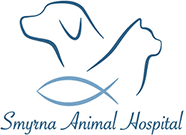Your golden retriever Gus has always been an eating machine. Even when Gus was a puppy, he would inhale his food and then troll the floors looking for meal-preparation fallout. Now that Gus is much taller, he can double his trolling territory, scouring the counters from a comfortable standing position. However, Gus has hardly touched his food for several days, and he’s actually looking a bit gaunt. Since Gus’ total disinterest in food concerns you, you’ve asked your Marietta veterinarian to see if Gus has a medical problem that affects his appetite.
Significant Symptoms
While Gus’ skimpy food intake is clearly reflected in his weight loss, you might also see his stomach become distended. Gus might develop a fever, along with an unhealthy-looking skin color and eye appearance. He might also appear to be in pain. You might have trouble hearing Gus’ heart and lung sounds, and he may also become strangely short of breath.
Diverse Causes
Gus’ appetite loss could result from a gastrointestinal, infectious, respiratory, or endocrine disease, to name a few. Or, Gus could have experienced a prescription drug reaction or a cardiac problem. If Gus is an older guy, he might be losing his appetite as a natural consequence of aging. Finally, Gus’ stress level might be off the charts, perhaps from a change in his diet or living environment.
Diagnostic Process
Your vet has some intensive detective work ahead. He’ll ask you about changes in Gus’ diet, including whether he has experienced sudden difficulty in chewing or swallowing his food. Your vet will also ask you about changes in Gus’ living environment or daily routine.
Next, your vet will request complete blood work, a urinalysis, a heartworm exam, and X-rays of Gus’ chest and abdomen. Your vet will likely obtain varied tissue samples as well. Finally, your vet will give Gus a thorough physical exam. Your vet will devote special attention to Gus’ teeth, eyes, nose, face, and neck areas.
Tailored Treatment
Now that your vet knows what’s bothering Gus, he’ll treat that underlying problem first. Next, your vet will likely revise Gus’ diet. Your vet might increase the food’s protein or fat content, and he might also make the food more appealing by adding enticing flavorings or slightly heating the food.
Finally, keep an eye on Gus’ eating habits. If Gus’ appetite doesn’t return after a couple of days, your Marietta vet wants to see him for additional treatment.



